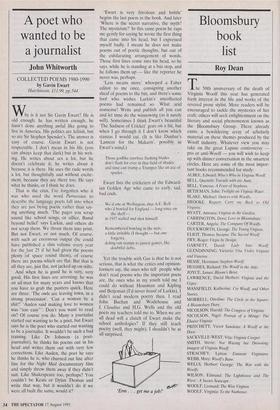A poet who wanted to be a journalist
John Whitworth
COLLECTED POEMS 1980-1990 Why is it not Sir Gavin Ewart? He is old enough; he has written enough; he hasn't done anything awful like going to live in America. His politics are leftish, but so are Sir Stephen Spender's. The answer is easy of course. Gavin Ewart is not respectable. I don't mean in his life (you can always keep that dark) but in his writ- ing. He writes about sex a lot, but he doesn't celebrate it; he writes about it because it is there. He uses the rude words a lot, but thoughtfully and without excite- ment, because they are there too. He says what he thinks, or I think he does.
That is the crux. I've forgotten who it was who used the word Parnassian to describe the language poets fall into when they are just being poetic rather than say- ing anything much. 'The pages you scrap sound like school songs, or sillier, Banal beyond belief says Larkin, and others do not scrap them. We thrust them into print. But not Ewart, or not much. Of course, with such an enormous output (he could have published a slim volume every year for the last 25 if hd had given the poems plenty/Of space round them), of course there are poems -which are flat. But that is all they are, just flat, not jacked up on stilts.
And When he is good he is very, very good:\ His first lines are arresting; he was an ad-man for many years and knows that you have to grab the punters quick. Here are three: The owls are leaving town, in a strong procession'. 'Can a woman be a ,shit?Auden said making love to women was "too easy" '. Don't you want to read on? Of course you do. Many a journalist started out wanting to be a poet, but Ewart says he is the poet who started out wanting to be a journalist. It wouldn't be such a bad training. Like Dr Johnson (a poet- journalist), he thinks his poems out in his head and writes them out with very few corrections. Like Auden, the poet he says he thinks he is, who churned out line after line for the Night Mail documentary film and simply threw them away if they didn't suit. Like Shakespeare too, perhaps? You couldn't be Keats or Dylan Thomas and write that way, but it wouldn't do if we were all built the same, would it? 'Ewart is very frivolous and brittle' begins the last poem in the book. And later 'Where is the secret narrative, the myth? The mysticism?' In this same poem he zaps me gently for saying he wrote the first thing that came into his head, but I expressed myself badly. I meant he does not make poems out of poetic thoughts, but out of the exhilarating arrangement of words. Those first lines come into his head, so he says, while he is standing at a bus stop, and he follows them up — like the reporter he never was, perhaps.
'Less means more' whooped a Faber editor to me once, consigning another sheaf of poems to the bin, and there's some fool who wishes Larkin's uncollected poems had remained so. What arid nonsense! Write and publish all you can and let time do the winnowing (as it surely will). Sometimes I think Ewart's beautiful 'The Sadness of Cricket' goes on a bit, but when I go through it I don't know which stanzas I would cut. (It is like Dunbar's 'Lament for the Makaris', possibly in Ewart's mind.)
Those godlike carefree flashing blades don't flash for ever in that field of shades and time can trump a Trumper like an ace of spades.
Ewart lists the cricketers of the Edward- ian Golden Age who came to early, sad, bad ends.
We'd one at Wellington, that A.E. Reif who'd howled for England — long since on the shelf—
in 1937 stalled and shot himself.
Remembered bowling in the nets, a little irritable (I thought — but one forgets), doling Out stumps to junior games, like doubtful debts.
Yet the trouble with Gay is that he is not serious, that is what the critics and opinion- formers say, the ones who tell people who don't read poems who the important poets are, the ones who in my youth told me I could do without Housman and Kipling and Betjeman (I'd never heard of Larkin). I didn't read modern poetry then. I read John Buchan and Wodehouse and I, Claudius and H.G. Wells and the old poets my teachers told me to. When we are all dead will a clutch of Ewart make the school anthologies? If they still teach poetry (well, they might). I shouldn't be at all surprised.
'Erm . . get me a job!'


















































 Previous page
Previous page